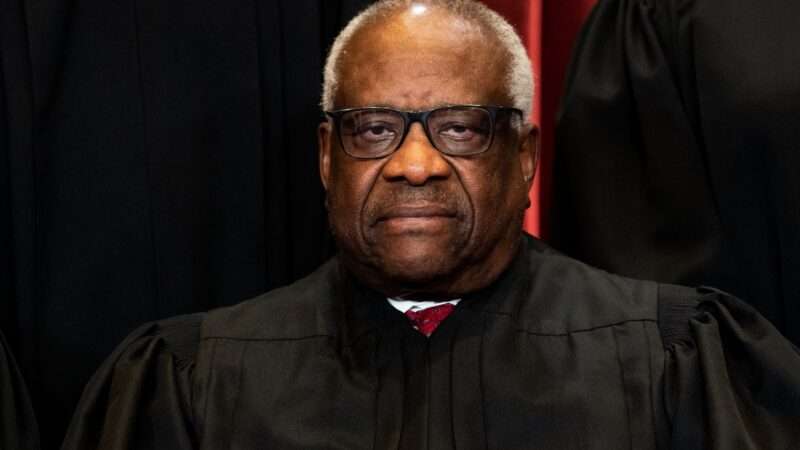
In today's Supreme Court ruling overturning Roe v. Wade (1973), Justice Clarence Thomas joined the majority opinion. But he also wrote a separate concurrence arguing that the logic behind today's ruling should also apply to previous Supreme Court decisions on same-sex marriage, sodomy, and the right to access contraceptives.
Today's majority opinion in Dobbs v. Jackson Women's Health Organization ruled that Roe v. Wade was wrongly decided and that the Constitution does not guarantee a right to an abortion. In the opinion, Justice Samuel Alito determined that the right to an abortion is not "rooted in the Nation's history and tradition."
Alito's decision, however, very clearly explains that he's not trying to claim that any right that isn't "rooted in the Nation's history" is potentially subject to being tossed out. This language was in the leaked draft opinion as well. He holds that part of what makes abortion different is that it involves the "destruction of a 'potential life.'" The decision states outright:
And to ensure that our decision is not misunderstood or mischaracterized, we emphasize that our decision concerns the constitutional right to abortion and no other right. Nothing in this opinion should be understood to cast doubt on precedents that do not concern abortion.
He specifically name-checks Obergefell v. Hodges (the 2014 ruling that mandated gay marriage recognition) and Griswold v. Connecticut (the 1965 ruling that stopped states from criminalizing contraception) as precedents he is not attempting to challenge with the Dobbs decision. He later reiterates that those decisions "are inherently different from the right to abortion because the latter (as we have stressed) uniquely involves what Roe and Casey termed 'potential life.'"
But Thomas wrote separately to say the court should reconsider those cases too. While abortion may be a unique issue involving human life, Thomas sees these other precedents as errors of the court because he fundamentally disagrees that the concept of "substantive due process"—that "due process" protects not just procedures but fundamental rights—has a constitutional foundation. Thomas has a history of arguing that the Due Process Clause does not actually guarantee rights but that proper procedures are followed.
Here, because the majority decision declined to address this issue, Thomas wrote separately to encourage them to:
For that reason, in future cases, we should reconsider all of this Court's substantive due process precedents, including Griswold, Lawrence, and Obergefell. Because any substantive due process decision is "demonstrably erroneous," Ramos v. Louisiana…(THOMAS, J., concurring in judgment)…we have a duty to "correct the error" established in those precedents, Gamble v. United States…(2019) (THOMAS, J., concurring)….After overruling these demonstrably erroneous decisions, the question would remain whether other constitutional provisions guarantee the myriad rights that our substantive due process cases have generated.
I have already started seeing tweets isolating Thomas' concurrence to indicate that this is a warning that the conservative Supreme Court justices are going to start attacking other precedents.
This response to Thomas' concurrence ignores that no other justice signed on to this concurrence, not even Alito. Even though six justices agreed that Roe v. Wade was wrongly decided, they were not willing to sign on to Thomas' argument that these other cases were also wrongly decided or that substantive due process is not supported by the Constitution.
In fact, the two concurrences he references above are also cases in which Thomas wrote that the Court was misinterpreting laws and the Constitution. And in each case, no other justice joined him.
Thomas' entire concurrence here is essentially him saying that substantive due process is nonsense and that the courts should go back and revisit all these previous precedents. Thomas has a history of writing these types of concurrences, but he also has a history of being completely on his own here. And that's exactly what happened today. It's getting much more attention because this is such a massive, important ruling, but it's not unusual for Thomas to do this.
It is, however, important that Thomas and the three dissenting justices, Stephen Breyer (who wrote the dissent), Elena Kagan, and Sonia Sotomayor, are actually on the same page: Despite what Alito might write in the majority opinion, the logic of Dobbs can ultimately in a future court result in what Thomas would like to see. Justice Breyer writes:
Consider, as our last word on this issue, contraception. The Constitution, of course, does not mention that word. And there is no historical right to contraception, of the kind the majority insists on. To the contrary, the American legal landscape in the decades after the Civil War was littered with bans on the sale of contraceptive devices. So again, there seem to be two choices. See supra, at 5, 26–27. If the majority is serious about its historical approach, then Griswold and its progeny are in the line of fire too. Or if it is not serious, then … what is the basis of today's decision? If we had to guess, we suspect the prospects of this Court approving bans on contraception are low. But once again, the future significance of today's opinion will be decided in the future. At the least, today's opinion will fuel the fight to get contraception, and any other issues with a moral dimension, out of the Fourteenth Amendment and into state legislatures.
Justices have often rejected Thomas' position against substantive due process, but that doesn't mean that the logic of the majority's opinion today can't be used against these other precedents. But the current makeup of the court, despite leaning heavily conservative, suggests that it will not.
Thomas is certainly inviting challenges to these precedents, and that shouldn't be ignored. It's also important to understand the logic and legal theory behind Thomas' position, that other conservative judges don't necessarily agree with him, and that potential challenges to these other precedents aren't just a matter of which political ideology is ascendant on the Court at any given time.
The post Clarence Thomas Calls To 'Reconsider' Gay Marriage, Sodomy Rulings appeared first on Reason.com.







